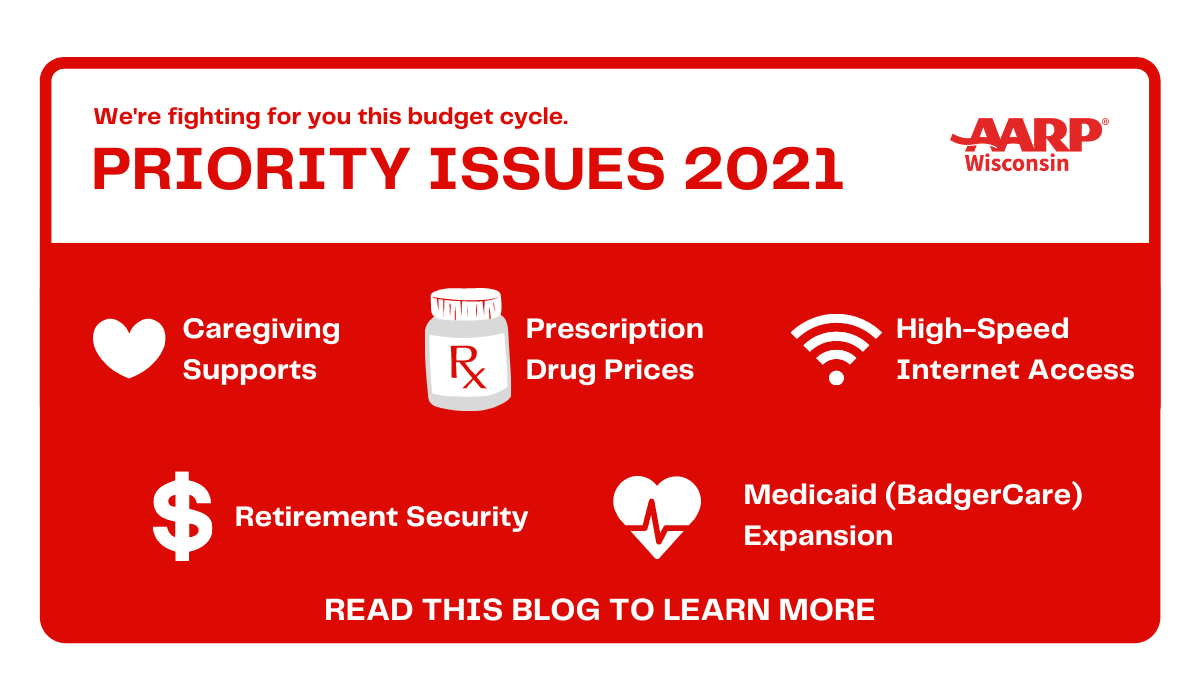AARP Hearing Center

AARP Wisconsin will be fighting to advance our priorities this Fall - we want more support for caregivers, broadband expansion, reductions in the high cost of prescription drugs, Medicaid expansion, and more ways for workers to save for retirement. We need your help to make these a reality.
Learn more about AARP's key issues that are represented in this year's biennial budget by clicking on the buttons below. You'll find a brief background, why the issue is important, and how you can take action in each section.
AARP Wisconsin's Priority Issues
Prescription Drugs
It is outrageous for Wisconsinites – and all Americans - to pay more than 3 times what people in other countries pay for the same medicine. Prescription drug prices are high because there is nothing stopping drug manufacturers from charging high prices. The drug companies entirely control the supply of a newer medicine because they hold the patent rights. That gives them a monopoly on the drug for the 20-year life of the patent and they can raise prices as frequently and as much as the market will bear. Drug companies also “game the system’ with patents and can seek approval for a “new” product that is a slight variation on the original, thus extending their monopoly even longer. In addition, high prices are often blamed on research and development costs when the reality is that virtually all of today’s drugs have roots in government-funded research at the National Institutes of Health or leading academic centers across the country.
Why It's Important
The skyrocketing prices of prescription drugs affect almost everyone in America, putting a strain not only on family budgets, but on state budgets as well. Our country has the highest brand-name drug prices in the world. While prescription drug prices continue skyrocketing, too many Wisconsinites are being forced to choose between filling life-saving medications or paying rent and buying food.
By the statistics:
- In 2017, 22% of Wisconsin residents stopped taking medication as prescribed due to cost.
- Nearly 80% of every Big Pharma dollar goes to something other than research and development.
- The average annual cost of prescription drug treatment increased 57.8% between 2012 and 2017, while the annual income for Wisconsinites only increased 12.9%.
AARP is fighting for legislation that would:
- Establish a $50 copay cap on insulin and create an Insulin Safety Net Program.
- Create a Prescription Drug Affordability Review Board that would reduce costs and prevent price gouging.
- Create the Office of Prescription Drug Affordability to serve as a watchdog over the pharmaceutical industry and look out for Wisconsin consumers.
- Increase consumer protections from deceptive marketing and advertising practices on Rx.
Key Points:
- Medications don’t work if people can’t afford them. Creating a $50 co-pay cap on insulin and an insulin safety net program will help people get the life-saving drugs they need.
- Drug companies are making billions in profits off seniors and taxpayers. A Prescription Drug Affordability Review Board would reduce costs and prevent price gouging.
- We need to make drug prices more transparent and easier to understand. Requiring oversight, licensure and reporting across the pharmacy supply chain - from pharmacy benefit managers to pharmaceutical sales reps - will help increase this transparency.
- It is unfair that drug prices keep going up, even for medications that have been on the market for decades. Proposals such as requiring drug makers to report the reasons behind dramatic prescription drug price increases are a great step understanding unfair drug prices.
- Americans shouldn’t have to pay the highest prices in the world for the medicines they need. AARP supports allowing the state to import safe and lower-priced drugs from other countries.
- People shouldn’t have to choose between buying medicine and paying for food or rent. AARP is urging the state legislators to lower prescription drug prices now.
High Speed Internet (Broadband)
Currently, nearly 600,000 Wisconsinites lack access to wired broadband services, and over 170,000 people lack access to any wired internet providers where they live. Rural communities account for the bulk of underserved areas as almost 28% of residents lack access to services, compared to a statewide average of 8.7%.
Why It's Important
Internet access via broadband is a necessity for access to telehealth services, which expands access to healthcare and overcomes many transportation barriers to accessing care.
AARP is fighting for legislation that would:
- Expand broadband infrastructure and subsidize monthly subscription fees for low income families.
Key Points:
- The Federal Communications Commission estimates that over 25% of rural households lack reliable high speed internet.
- Affordable, reliable internet service is no longer a luxury but a necessity for medical treatment, education, applying for programs and participating in basic civic and societal functions.
- Telehealth allows people who do not drive and are not near medical clinics to access both basic health care and to consult with specialists who may not be available in their area.
Caregiving
Wisconsin has 600,000 family caregivers who provide over 538 million hours of care valued at over $7.0 billion dollars in care every year, and more than three in four family caregivers are incurring out-of-pocket costs as a result of caregiving.
Why It's Important
Family caregivers work hard to keep their loved ones at home rather than in care facilities that cost taxpayers money. At some point in their life, the average person will either be or need a family caregiver - it is a smart long-term investment to support family caregivers.
AARP is fighting for legislation that would support caregivers.
- Caregiver Tax Credit - small financial relief to caregivers that allows older Wisconsinites to remain at home with greater independence with support from family members,
- Caregiver Education - provisions that create requirements for Hospitals to educate caregivers
- Caregiving coverage - expansion of the Wisconsin Family Medical leave Act to cover caregiving.
Key Points:
- Caregivers provide an essential service and experience financial strain.
- The Caregiver Tax Credit will allow freedom and flexibility for caregivers, keeping individuals in need of care at home and financially independent. The state will save money on long term care by investing in caregivers and keeping older Wisconsinites at home instead of relying on state-funded programs.
- Designated Caregivers need to be provided with essential information to care for loved ones. Almost half (46%) of family caregivers perform medical or nursing tasks – like complex medication management, wound care, and injections – for their loved ones. Most report that they received little or no training to perform these tasks.
- Care coordination meetings, discharge planning and medical appointments often take place during regular working hours and the current WMFLA covers only acute medical conditions. This make the benefit available to caregivers caring for someone with a chronic condition.
BadgerCare Expansion
BadgerCare Plus (known as BadgerCare) is a health care coverage program for low-income Wisconsin residents. Residents of all ages may be eligible and BadgerCare covers checkups, immunizations, emergency department visits, prescription drugs, lab visits, and other services.
Why It's Important
In this pandemic, we relearned the fragility of health insurance tied to employment and the high cost of COBRA coverage.
AARP is fighting for legislation that would expand BadgerCare.
Expanding Badger Care is cost-efficient and fiscally responsible as increasing federal match rates will save Wisconsin taxpayers money. The additional revenue can be spent strengthening public health systems and healthcare systems across Wisconsin.
Key Points:
- An additional 90,000 people could be covered under Badger Care if Wisconsin accepts full expansion.
- More options for affordable health care would be available to Wisconsinites if ACA plans were available.
- Additional match money could be obtained which would fund additional health services such as mental health services.
- This is not welfare. All but 12 states have accepted MA expansion. It is making health care available to many people who currently are uninsured or underinsured.
Retirement Security
The pandemic has shown how vital it is for Americans to have savings to depend on. We must make it easier for workers to save so they can take control of their future. Half of all households are at risk of not being able to handle everyday expenses – like medicine, utilities, and rent – in retirement. The average working-age household has only $2,500 in retirement savings, while those near retirement have saved only $14,500.
Why It's Important
While Social Security is a critical piece of the retirement puzzle, it is not enough to depend on. Many future retirees will not be able to handle the rising cost of basic needs and growing health care costs. The average Social Security benefit for a retired Wisconsin family is only about $20,000 a year, while they spend an average of $22,000 a year on food, utilities, and health care alone.
AARP is fighting for legislation that would:
- Create a Small Business Retirement Savings Board in the Department of Financial Institutions. The Board would be required to establish and oversee a small business retirement savings program for certain privately employed individuals who are not eligible for an employer-sponsored retirement plan.
Key Points:
- People are 15 times more likely to save in the workplace, yet nearly 930,000 Wisconsin workers are in jobs that do not offer any options for retirement savings.
- People who work for themselves or for small businesses are those hardest hit by the pandemic and are also much less likely to have retirement savings options at work.
- In an AARP survey, 88% of Wisconsinites wish they had saved more for retirement.
- Only 40% of people who work for small business have access to a workplace retirement savings program.
- 400,000 Wisconsin seniors will be living in poverty in 2030 if we don’t address the retirement crises.
- AARP surveyed small businesses in WI and found that they’d like to offer retirement benefits but find it too costly, too complicated or too time consuming to figure out.
- The Small Business Retirement Program would, ultimately, save taxpayer dollars by giving people a way to save so they don’t have to rely on public assistance programs later in life.
- In addition, AARP supports other recommendations of the Governor’s Task Force on Retirement Security.









































































